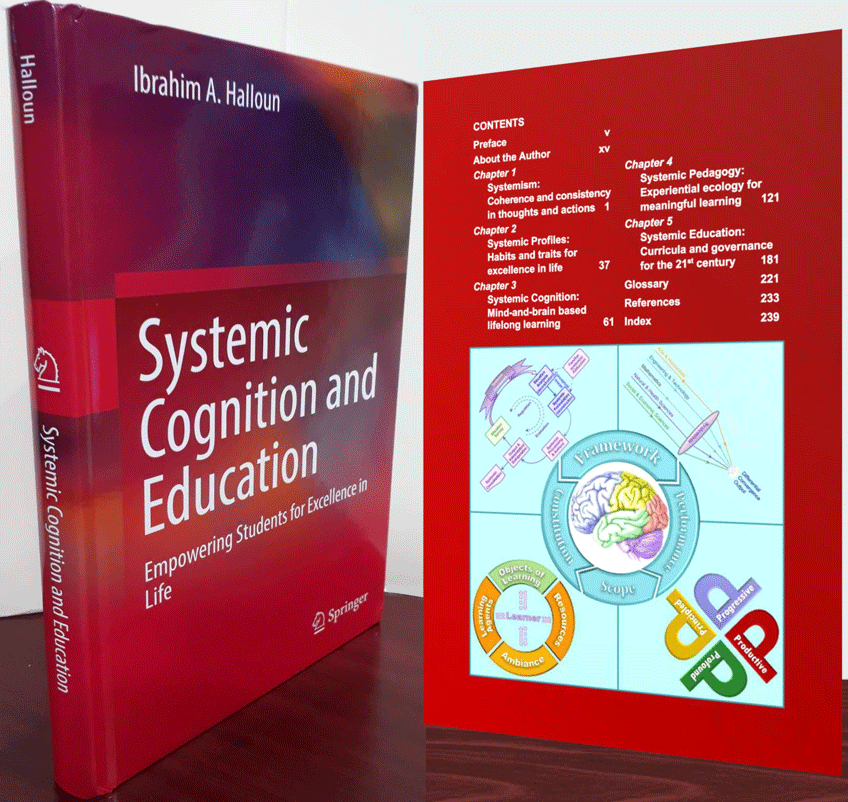Pedagogy, curricula, and governance for the 21st century
.
 .
.
Systemic Cognition and Education (SCE) is envisioned to systematize the entire educational enterprise so as to efficaciously meet the realities of the 21st century and bring up students with progressive minds, productive habits, profound knowledge, and principled conduct (i.e., with 4P profiles), thus empowered to think outside the box and excel in various aspects of life.
SCE draws on philosophy, cognition, and latest developments in neuroscience, as well as on reliable research, theory, and practices in education. It relies on systemism to provide a seamless paradigmatic perspective on the entire educational enterprise in conformity with how the world within us and around us is and works. SCE offers in particular substantiated premises, tools, and guidelines for:
- Mind-and-brain based, experiential pedagogy that prepares students for lifelong learning whereby they can develop and readily transfer generic learning habits and disciplinary knowledge within and across disciplines in the same and different fields.
- Coherence and consistency within and across disciplines and curricula to the extent of bringing forth differential convergence among disciplines under curricula designed for Systemic, Praxis-Immersive, Convergence Education (SPICE).
- Systemic governance of educational institutions and entire educational systems that engages various stakeholders in propitious decision making and implementation so as to meet realistically and efficiently the needs and aspirations of individual people and communities for self-fulfillment and continuous and sustainable development.
.
Select Publications:
.
SPICE: Systemic, Praxis-Immersive, Convergence Education. A Paradigm Shift in Education for Excellence in the 21st Century. (2023).
The world within and around us is a world of systems. Major innovations of our time are the upshots of praxis-based disciplinary convergence, i.e., of bringing together, into generative consonance, theory and practice from different disciplines, especially disciplines from different fields like arts and science. Formal education has thus to opt for paradigms that are in harmony with the systemic nature of the world, particularly of our minds and brains, and that meet the realities of the 21st century, particularly in the job market. Systemic, praxis-immersive, convergence education (SPICE) is proposed to this end. Full Text
.
Systemic Cognition and Education: Empowering Students for Excellence in Life. (2023, Springer)
The book is major design and practice reference for school teachers, university professors, graduate students, curriculum developers, and all other educators, educationists, and stakeholders in various sectors of society. It is unique in presenting a coherent, across-the-board systemic perspective on various aspects of the educational enterprise, from pedagogy to governance of educational systems and institutions. It offers practical, cross-cutting tools and guidelines for learning, instruction, curriculum design and implementation, and the overall educational ecology.
Please click here for book access at Springer
Please click here to download an outline of the book (Chapters’ abstracts).
Please click here to download the book Front Matter (Preface, TOC, Author).
Systemic Cognition and Education. (2022). HPS&ST Newsletter, Sep. 2022, 35(8), 4-7.
Systemic Cognition and Education (SCE) is envisioned to systematize the entire educational enterprise so as to empower students to think outside the box and excel in various aspects of life. SCE draws on philosophy, cognition, and latest developments in neuroscience, as well as on reliable educational theory and research. It offers substantiated mind-and-brain based experiential pedagogy, brings about coherence and consistency within and across disciplines and curricula, and lays the ground for efficient and just governance of educational systems and individual institutions. Full Text
..
.Cognition and Education: A Bungean Systemic Perspective. (2019). In: M. R. Matthews (Ed.), Mario Bunge: A Centenary Festschrift, pp. 683–714. Boston, MA: Springer.
A systemic worldview helps us make sense of the world around us and flexibly systematize how we go about constructing, retaining, and deploying all sorts of knowledge. Formal education is then supposed to provide for systemic cross-disciplinary curricula designed and deployed under systemic pedagogical frameworks, like the Systemic Cognition and Education framework, to empower students with systemic profiles for lifelong learning and success in life. Full Text
.
Mind, Brain, and Education: A Systemic Perspective. (January 2017). Working paper.
An interpretation of research findings in neuroscience, cognitive psychology, and education, through specific conceptual lenses drawn primarily from the philosophy of science and cognitive science, brings about a systemic perspective on mind, brain, and education (MBE), and lays down the foundations of Systemic Cognition and Education, an MBE-based generic pedagogical framework. Full Text
.
.
Enhanced knowledge taxonomy in education
Creativity, problem solving, critical thinking: Are they all skills? (February 2023).
A mix-up prevails in the educational literature within and among unidimensional and multidimensional knowledge aspects. Precise knowledge taxonomy based on sound cognitive criteria and cutting across disciplines is necessary to adopt efficient pedagogy for learning and teaching all sorts of knowledge and to design and implement appropriate curricula. Full Text
.
SCE Taxonomy of Learning Outcomes. (2017 / 2019).
Students are empowered for excellence in life under systemic curricula that mandate systems and systemic competencies in the form of learning outcomes spelled out in accordance with a well-defined taxonomy. This paper introduces the SCE taxonomy and discusses how it resolves certain critical issues in Bloom’s taxonomy. Full text
.
SCE Taxonomy of Learning Outcomes: Rational Subsets. (2014 / 2019).
Subsets or particular reasoning skills are presented of the five rational facets in the SCE taxonomy (Halloun, 2017/19): analytical reasoning, criterial reasoning, relational reasoning, critical reasoning, and logical reasoning. Full Text
.
SCE for coherence and consistency in STEM education
Model-based convergence in science education in the framework of Systemic Cognition and Education. (March 2020).
Convergence within and with science education may be optimized when science curricula are model-based designed in the framework of Systemic Cognition and Education (SCE). This paper presents an overview of models and modeling in the framework of SCE, provides modeling tools like the system schema for model construction and a systemic scheme for model deployment, and discusses ways and advantages of model-based differential convergence in science education. Full Text
.
Scientific Models and Modeling in the Framework of Systemic Cognition and Education. (August 2018). Working paper.
Models and modeling may serve pedagogical purposes as much as scientific purposes. This paper presents an overview of models and modeling in the framework of Systemic Cognition and Education (SCE) and provides modeling tools like the system schema for model construction, a systemic scheme for model deployment, and a rubric for tracking the evolution of student profiles in meaningful ways. Full Text
.

.
.
The following are early drafts of SCE then called Profile Shaping Education (PSE). They are superseded by the above publications.
Profile Shaping Education: An Overview. (March 2012. Plenary paper). Proceedings of ACES conference on Education Dubai, UAE: ACES.
Profile Shaping Education (PSE), the precursor of SCE, is a research-based pedagogical framework that promotes a particular 4-P profile (Paradigmatic, Productive, Proactive, Principled) meant to empower students for meaningful learning rather than rote learning of course materials, and for success in modern life rather than for merely passing school or high-stake exams. The profile is reified in cross-disciplinary curricula in the form of learning outcomes that are defined according to a novel taxonomy of learning expectations.
.
Taxonomy and Learning Outcomes. (March 2012. Plenary paper). Proceedings of ACES conference on Education Sustainability. Dubai, UAE: ACES.
Under PSE, the 4P profile is reified in various educational fields following well-defined cognitive tenets and pedagogical principles and rules. The profile can be translated in any given curriculum in the form of epistemic, cognitive, behavioral and metacognitive learning outcomes in accordance with a novel taxonomy developed by this author.
.
Profile Shaping Education: A Paradigm Shift in Education to empower Students for Success in Modern Life. Paper presented at the 11th International History, Philosophy and Science Teaching Group biennial conference. Aristotle University, Thessaloniki, July 2011.
This is an early draft of Profile Shaping Education (PSE) which, like SCE, sets to empower students of all levels, especially secondary school and college graduates, with a profile needed for success in modern life. The profile embodies major traits of accomplished people in the workplace and daily life, while it respects the local vision for education and local culture and heritage.
.
From Modeling Schemata to the Profiling Schema: Modeling across the Curricula for Profile Shaping Education. (2011). In: Khine & Saleh (Eds), Models and Modeling in Science Education. Boston: Springer.
This chapter outlines the cross over to Profile Shaping Education (SCE predecessor) from Modeling Theory, a research-based pedagogical theory developed by this author that promotes mediated experiential learning of model-laden theory and inquiry in science education. Modeling schemata are generic tools that students use for systematic construction and deployment of scientific concepts and models. Under PSE (and subsequently under SCE), these schemata have been extrapolated beyond the boundaries of science, and a single profiling schema (systemic schema under SCE) has emerged as a major tool to set and deploy benchmarks or outcomes that need to be accomplished in any educational field, and at any grade level. Full Text


